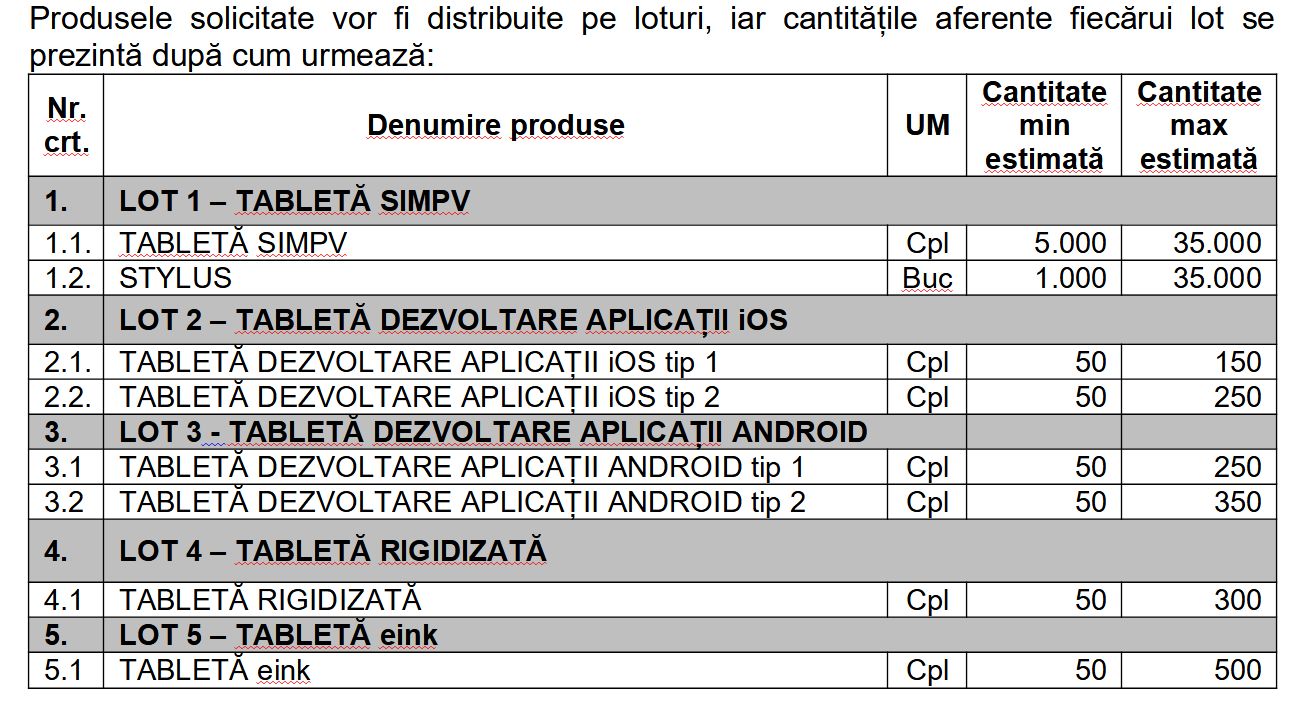
The Special Telecommunications Service (STS) on Wednesday launched an open tender for the purchase of tens of thousands of tablets that will be used in the IT system to monitor attendance at polling stations and prevent illegal voting in the context of next year’s planning. four lines of elections: local, parliamentary, European parliamentary and presidential.
The Special Telecommunications Service (STS) wants to conclude 5 framework agreements for the purchase of tablets and related accessories for interaction with the IT system for monitoring the turnout for voting (SIMPV), tablets for the development of iOS and Andorid applications, as well as custom tablets. with access to critical programs.
The total estimated value of these transactions exceeds 94.5 million lei (without VAT)of which most of the money – more than 84 million lei – will go to the tablets used in the IT system to monitor attendance.
STS: Current tablets are either broken or beyond repair

In the specifications, DTS notes that it “currently has a significant number of tablet-type mobile terminals that are either defective and beyond repair, or repair is not economically justified. Also, the STS provides for the gradual replacement of this equipment, which is morally worn out.”
For companies interested in providing these tablets to be used in the IT system after the elections, the DPS requires that their average annual turnover for the last three financial years (2020, 2021 and 2022) be at least 60 million lei.
In addition, the DPS requires as a minimum qualification requirement for similar experience that the tenderer proves that during the last three years, calculated before the deadline for submission of tenders, it has supplied products similar to the one that is the subject of the procurement, in aggregate value. at least 60 million lei.
The coalition is discussing the combination of local and parliamentary elections, but no decision has been made
The scenario of merging local and parliamentarians exists and is being discussed at the coalition level, President Klaus Iohannis confirmed on April 13.
The head of state says that there is a possibility of moving the premises to the date of the parliamentarians.
- “Unification of elections is discussed in the parties, it is an option that is possible, constitutionally possible, but it is impossible to bring parliamentarians together. However, the room may be delayed.
- Whether this will be a solution or not, we will see along the way. There were initial discussions at the level of the Coalition, and it is still being evaluated whether it gives anything – if it does not give anything for either the citizens or the parties, it should not be done. But, I confirm, this discussion exists, there would be constitutional technical solutions, but they can be implemented only when there is an obvious benefit from it.
- But I would go a little deeper into the topic – why is this being discussed? Usually in Romania next year, 2024, we will have many elections. This is reality. Four series of difficult elections in one year is problematic.
- You understand that from this fall until the end of next year, we would be constantly in electoral competition, with election campaigns, with disputes on television, in social networks. Obviously, for you in the mass media it would be a festival, but for Romanians, I don’t know if it will be a festival, and I don’t know if holding elections in the country for a year and a half is a good thing for ordinary people.
- After all, people want to see that someone is dealing with their problems, that the country is moving forward, that European money is being used, and not just being talked about on TV, etc. So, there are grounds for discussion, but no decision has been made yet.” said Johannis.
At the end of the term in Victoria Palace and in the midst of a scandal involving money from the PNRR and special pensions, the Liberals again launched the topic of electoral consolidation into the public space. With the polls falling, PNL leaders are calculating to retain power and stay in government next year, which is predicted to be disastrous for the party led by the Nicolae Chuke-Lucian Bode tandem.
- Read more: What the PNL does not say when it comes to combining elections. Half-truth in the account of the party
Source: Hot News
Lori Barajas is an accomplished journalist, known for her insightful and thought-provoking writing on economy. She currently works as a writer at 247 news reel. With a passion for understanding the economy, Lori’s writing delves deep into the financial issues that matter most, providing readers with a unique perspective on current events.